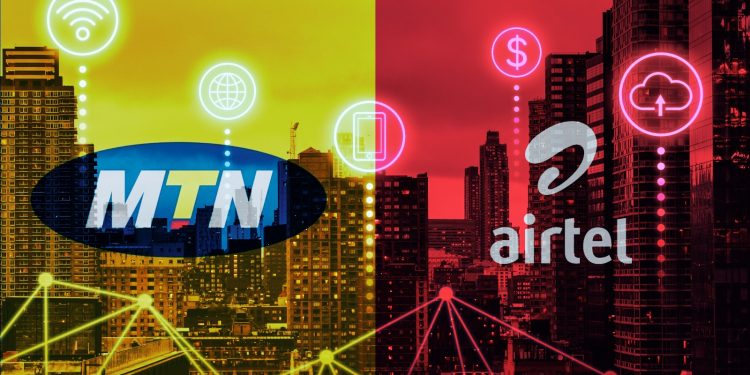Nigeria Surges Ahead as Africa Boosts Data Infrastructure
Nigeria is emerging as the latest focal point in Africa’s fast-growing data infrastructure sector, with MTN and Airtel unveiling landmark projects in Lagos. The surge is part of a broader continental push to build AI-ready capacity, boost digital sovereignty, and attract global investment.
Bonface Orucho, bird story agency
Nigeria is the latest flashpoint in Africa’s fast-evolving data centre race, where, beyond storing and serving data, the focus is shifting to enabling the next generation of artificial intelligence applications.
In recent weeks, two of the continent’s biggest telecom players, MTN and Airtel, have unveiled competing infrastructure projects in Lagos that could redefine what’s possible for West Africa’s digital economy.
MTN’s Sifiso Dabengwa Tier III facility, launched in July 2025, boasts a 4.5 MW IT load capacity, expandable to 9 MW, making it the largest data centre in West Africa.
Airtel’s response has been swift, announcing a hyperscale facility at Eko Atlantic City with a staggering 38 MW IT load, designed for GPU-heavy workloads critical to AI.
The US$120 million facility, expected to go live in 2026, is part of Airtel’s cloud-first strategy, prioritizing AI compute capacity and addressing a gap flagged in Nigeria’s 2024 draft National AI Strategy.
The International Business Machines Corporation (IBM) defines a data centre as a physical space that houses IT infrastructure for building, running, and delivering applications and services.
According to experts, such infrastructure is “the silent power that determines who thrives and who lags behind in the digital age,” says Karani Geoffrey, CEO of Upeosoft Limited, a software company.
“High-speed networks, regional data centres, cloud availability zones, and low-latency connections are what allow fintech, e-commerce, AI, and all digital innovation to flourish,” he explained.
The State of Africa’s Infrastructure Report 2025 notes that there’s a larger continental trend, as “the continent leapfrogs in specific, high-value areas like AI-ready computing.”
The timing of the announcements in Nigeria aligns with a broader surge in data center development across Africa.
Projections from the report indicate Africa’s data center construction market will nearly triple in value by 2030, from US$1.3 billion in 2024 to over US$3 billion.
Growth is being fuelled not only by hyperscale players like Airtel and MTN but also by smaller regional facilities responding to cloud adoption, fintech expansion, e-commerce growth, and public sector digitization.
Lagos and Nairobi alone are expected to add more than 100 MW of new IT capacity over the next three years.
<script src=”https://bird.africanofilter.org/hits/counter.js” id=”bird-counter” data-counter=”https://bird.africanofilter.org/hits/story/?id=2331&slug=nigeria-takes-centre-stage-in-africa-s-evolving-data-centers-race” type=”text/javascript” async=”async”></script>
In East Africa, IXAfrica’s second hyperscale build will add 53 MW, incorporating advanced on-chip cooling to meet AI’s processing demands.
Institutional investors are also moving in. Earlier this year, the International Finance Corporation committed US$100 million to Raxio Group to develop facilities in Ethiopia, Angola, Ivory Coast, Mozambique, the Democratic Republic of Congo, and Uganda, its largest-ever digital infrastructure investment in Africa.
Private equity funds are backing build-to-suit models for hyperscale clients, while sovereign wealth funds in Morocco and Botswana are exploring the sector as part of diversification strategies.
Global technology players are also expanding their footprints in Africa. In February, Huawei Cloud announced it would invest US$300 million over five years to enhance Egypt’s cloud services, supporting 200 software partners, 1,300 channel partners, and training 10,000 developers.
In December 2024, Huawei launched Nigeria’s first local cloud, becoming the first global cloud provider to offer in-country services.
Hosted on Tier 3+ data centres, Huawei Cloud reports delivering ultra-low latency of just 15 ms, offering storage and compute power optimised for local industries while ensuring all data remains within Nigeria’s borders.
Visa also recently opened a Johannesburg data centre hub to lower latency for payments and meet stricter data localisation rules.
Morocco, however, remains a continental leader. The kingdom has overtaken South Africa as Africa’s top host of data centres, with 23 operational facilities concentrated in Casablanca, Rabat, and Fès.
It also leads the upcoming pipeline, capturing 35% of Africa’s projected power capacity growth, with 56 new facilities set to launch continent-wide by 2027.
Sustainability and sovereignty are central to Africa’s strategy. In Morocco’s Dakhla, a 500 MW renewable-energy-powered data centre is part of the Digital Morocco 2030 roadmap, backed by MAD 11 billion (US$1.22 billion) in national investment over 2024–2026.
In a sign of growing international interest, Naver Cloud, in partnership with Nvidia and Nexus Core, has announced a 500 MW AI-grade data centre campus in Morocco to serve EMEA workloads.
Governments elsewhere are also positioning data centres as tools for digital sovereignty.
In Cameroon, a 2025 state-backed study mapped the national ecosystem and called for stronger certification regimes, better connectivity, and more energy-efficient designs.
Egypt’s policy shifts on data localisation have spurred more in-country hosting of government services, while Kenya is incentivising builds beyond Nairobi to spread economic benefits.
Yet capacity alone does not guarantee capability. The sector faces a significant skills gap in electrical engineering, cooling systems management, and AI infrastructure operations.
Teraco, South Africa’s largest operator, has launched a Data Centre Academy to train technicians and engineers, with a focus on improving diversity in a historically male-dominated sector.
Teraco has this week completed its JB4 expansion in Johannesburg, bringing the standalone facility’s critical IT power load to a commanding 50 MW.
Designed for hyperscale cloud, AI, and big-data workloads, the campus spans 80,000 m² and includes 14 data halls housing six new 5 MW units.
The build features a zero-water, closed-loop chilled water cooling system and AI-driven energy optimization to boost efficiency.
The energy demands of AI-grade facilities are also prompting investment in renewables. Teraco is building a 120 MW solar PV plant in South Africa to power its sites by 2026, while Africa Data Centres is developing a 12 MW solar farm in the Free State under a 20-year power purchase agreement.
Such efforts are vital considering the scale of the current gap.
According to Karani, “90% of Africa’s internet traffic is still routed through servers outside the continent.”
“Africa hosts less than 1.3% of the world’s data centre capacity, despite holding 18% of the world’s population. This means a simple email from Nairobi to Lagos may travel via Europe or the U.S. before returning home.”
“This offshore dependence slows applications, raises costs, creates regulatory headaches, and limits Africa’s ability to build sovereign digital ecosystems.”
bird story agency








